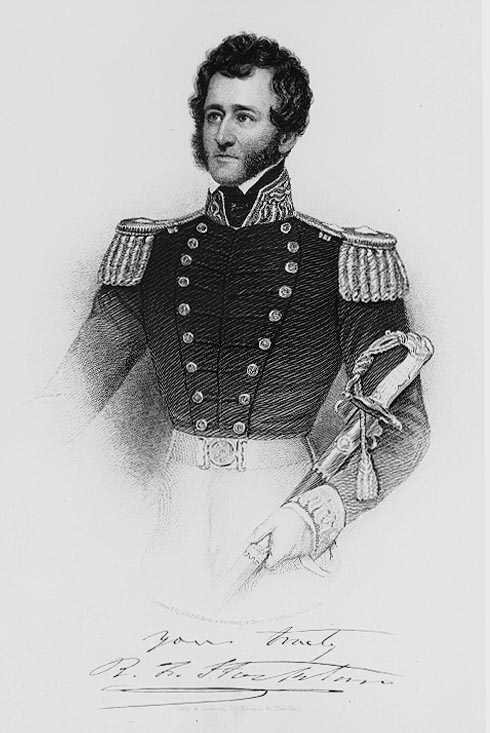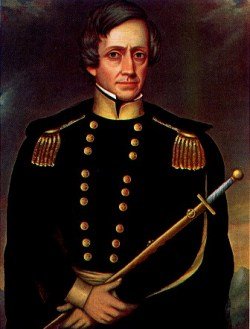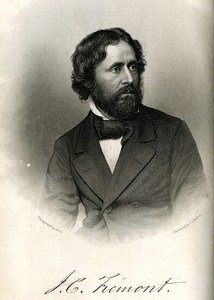Robert F. Stockton "Fighting Bob"
Back in the early 1800s, there was a young boy in New Jersey, the boy had been born into a family of high standing in the still young United States. His grandpa was even one of the signers of the Declaration of Independence and his dad was a senator. Because of this, this boy had access to the best education money could buy. He even got into Princeton University at the ripe old age of 13 it helped that his great great grandpa was one of its founders too. He was raided to be an elite, to learn the law and go on to be an attorney then judge and possibly get into politics like the rest of his family but he began to read about a man named Lord Admiral Horatio Nelson who had died back in 1805.
Admiral Nelson (pictured) was an inspirational figure a hero, a martyr for England, someone this young man would strive to emulate for the rest of his life. within a couple of years, this young man would leave Princeton and begin studying at his uncles’ naval academy. Then his time came in February 1812 to go to war. He was 17 years old.
By June of that year, he was on the ship as a midshipman under Commodore Rodgers. The ship was chasing after a British one and began to fire on it. but disaster struck when one of the bow chasers, which is a type of cannon, blew up. The result of that was 2 dead and 14 wounded including Commodore Rodgers and a young midshipman who you may have heard of Matthew Perry. This caused the ship to fall back and let the British get away. This young man showed himself to be strong and willing and calm in the midst of intense battle which gave him the nickname Fighting Bob.
Commodore Rodgers
After the war of 1812, Stockton had moved up to 1st Lieutenant. Very much a fighter as his nickname would suggest He continued in the Navy in the war against the barbary states and during that would find himself in duels with British soldiers who insulted The United States.
Around this time He was also asked to find a place in Africa to relocate the Freed slaves back to the states. In case you didn't know, The united states at its founding wanted to ban slavery outright but 3 of the 13 states said no (South Carolina, North Carolina, and Georgia). So for the sake of unity, slavery was kept but the idea was to eventually get rid of slavery eventually.
Often Slaves would be freed at the death of their owner so there were more and more freed slaves in the united states but they were not American, they often didn't want to be either but they couldn't go back to their home in Africa because the slave trade was run by Africans. Smaller weaker tribes would be captured by bigger stronger tribes and then sold out around the world so it would be unsafe and foolish for them to return to their home. Africa is a huge continent it's not a country it was not all “happy dappy schlappy pappy puppies and rainbows” like some people would like you to think. This is why a group called The American Colonization Society was formed. One of its founders was Francis Scott Key, the guy who wrote the Star Spangled Banner. It was also very much supported by the South for its own reasons and the North for its reasons.
Their goal was to find a good place in Africa where they could set up a colony for these freed slaves and help them adapt back into the land and be kept safe from the other African Tribes who may want to capture and enslave or simply kill them. So in 1920 This group brought 91 freed slaves to West Africa but the people there said no to their arrival so they jumped from place to place until they were welcomed. which was Sherbo Island.
It didn't work out too well since the immune system of these freed slaves were no longer adapted to African diseases and about a quarter died from yellow fever. Other trips to West Africa also proved deadly from disease for both the Americans bringing them there and the Freed Slaves themselves. Stockton joined in the search in 1821 arriving at Sierra Leone and met with a governor there who told him the best place to go was south a few hundred miles but there was also a huge problem too. The Native Tribes that lived nearby. They were known for being extremely brutal and nonnegotiable with strangers. Many have tried to buy land but many have failed.
Stockton was up for the challenge and went down to Cape Mesurado and began to meet with the kings and leaders in the area. The top man to convince was King Peter. Stockton was able to befriend King Peter and was able to convince him of the benefits of allowing a colony of Freed Slaves to be on his land. Better trade, New arts, New Agricultural methods, and so on. Stockton was successful and a deal was made, but a problem came when it was time to sign the deal. King Peter and all the tribesmen were missing. Stockton set out on a search going 20 miles into the jungle where he found them but they were no longer friendly. About 500 men surrounded him armed with knives and swords.
It turned out that a mulatto, which is a half white half black man, who was part of the slave trade convinced King Peter that Stockton had anterior motives and was anti slave trade. King Peter was part of the slave trade capturing other tribes and selling them off and taking their land. Stockton realized what happened and yelled "Silence!" and pulled out a pistol, cocked it, and gave it to a man next to him, pointed at the mulatto saying to shoot him dead if he opens his mouth. Then Pulled out another Pistol and cocked it and pointed it right at King Peters' head and asked to be heard, He then began defending himself and his motives and explaining again that a colony would be really good for them. He then lowered his pistol and said if they still don't want the deal they can kill him and all his men right now but God would punish them for it. At the moment he said this, the sun peaked out from behind the clouds shining right on Stockton. That was all the convincing they needed. The deal was signed.
The land was given by the tribe kings Peter, George, Yoda and Long Peter. The land was mostly coastal and went on to become the Republic of Liberia. Whose flag looks very similar to the Texas Flag and the American Flag. There are 11 stripes, which symbolize the signatories of the Liberian declaration of independence, the colors white and red symbolize courage and moral excellence. the white star is because Liberia was the first independent republic of Africa and the blue square is Africa.
After all this he went back to America, capturing slave ships as he went. He got to America essentially broke and was 28 years old. He was very low paid and owned no land no businesses and without orders from the Navy he was kind of lost at this stage of his life. Luckily for him though he married a young lady from South Carolina whose dad was a big business and plantation owner kind of guy who had lots of investments and even ran for president twice.
Stockton started his own newspaper called the New Jersey Patriot. Got into politics a little and even got into a fistfight over his honor in the middle of a Democratic convention. Became a plantation man himself owning a little over 100 slaves to operate it which is interesting and confusing because of the work he did for the Republic of Liberia.
Anyways, he continued his business life in the railroad and canal industry and did really well in that, kind of having a monopoly, his business life was not without some fighting but let's fast forward to the 1840s
At this point in time, Stockton got back into the navy though he technically never left it, and one of the first things he did was lobby for new steamships to be built since England and France seemed to have better ships which is a national security threat. He got it and soon a ship named the USS Princeton was born.
Once it was built there was an inaugural cruise down the Potomac river and lots of high-ranking people came aboard. As they cruised down they fired the canon 2 times which also was top of the line, then they wanted to fire again as they passed Mount Vernon as a salute to George Washington. By this time the majority of the people on board had gown down into the ship for lunch and…
For whatever reason when Stockton pulled the string to fire. it exploded and hot metal was blasted all over the place a few people died including the Secretary of state, Secretary of the Navy, and President Tyler's father-in-law. Stockton himself had a piece of iron fly through his leg and his hair all burnt off. He was taken to court over it but was cleared of any wrongdoing.
Now lets get to the California part.
Stockton was sent to Texas to check out the situation there, Texas was its own Country at this point with most wanting to annex into the United States but still having issues with Mexico it was kind of a big mess. Stockton was sent kind of undercover to observe everything going on in Texas but he blew his cover and told the president of Texas that President Polk wanted Texas to be extra hostile to Mexico so that when Texas became a state it would bring The United States into a war with Mexico which was a likely win since Mexico has a vastly inferior military and a win would give the United States the ability to expand further to the west… Stockton wasn't supposed to say that outright though and Stockton got in big trouble for revealing the plan.
But it worked nonetheless.
Fast forward just a little bit.
Stockton was told to bring some people to The Sandwich islands which is Hawaii. After that, he docked in Monterrey, CA. At this time The Bear Flag Revolt came and went and Commodore Sloat had declared California for the U.S. I tell you about a little bit in my episode about William Leidesdorff. President Polk was afraid that an independent California would easily be taken over by England so it was important to quickly call dibs.
Which, by the way, records show that British ships came just days after Sloat declared California for the U.S. saw the American flag, and decided it was not worth fighting for.
Commodore Sloat
Stockton had no orders to go to California but took the opportunity to tell Commodore Sloat that he was there, it turned out that Sloat was waiting for his replacement so he could go back home and without double checking gave his post to Stockton.
This made Stockton Commander in Chief of the territory of California. A happy accident that Stockton took and ran with. Immediately Stockton put out a proclamation accusing Mexico of being hostile to the United States and essentially declared war with Mexico.
There is a lot to the story but essentially there were 3 general forces in California for the United States, Stockton having the strongest and then General Kearny and General Freemont having about equal but smaller forces.
Stockton, Kearny, Freemont
Stockton Started for Los Angeles to fight General Castro's army but Castro retreated to Sonora which is the part of modern-day Mexico that is south of Tucson Arizona.
Claiming victory, Stockton wrote to President Polk telling him that he was not in Honolulu like he was ordered but was actively taking over California and would probably be done within a few months. He then said once he has conquered entirely he will hand the torch to someone else and he will go back to sailing the sea.
After that Stockton put out another Proclamation announcing martial law until California is completely under the United States. Not long after that General Kearny and Gillespie in San Diego were not having as good of luck and Stockton made his way there to fight off the Mexican army and won. Signing the treaty of Cahuenga
There was quite a bit of infighting among Stockton and the other generals over who was in charge after the war but it came to an end when a superior of Stockton arrived, Captain Shubrick. who then was outranked by Captain Biddle who came not long after Stockton was reduced to nothing and was told to go back home.
Before going home though, Stockton bought some land over by Santa Clara which became a really good investment because of the Gold rush a few years later, Stockton had a mining operation back near his home in New Jersey but when the Gold rush came he sent his best workers and tons of machinery to get a head start on gold. He also made an orchard and buildings that were recreations of the homes he had back in Princeton. During that time he was a Senator for New Jersey. He sold it all after his wife died in 1862 and made a nice profit of almost 2 and a half million dollars.
As a Senator,
Stockton advocated for taking the rest of Mexico as well but the lack of Americans living there kept the "All of Mexico" movement from happening as the values of Mexicans did not equal American Values. Stockton also advocated for the banning of flogging as punishment which was passed.
During the Civil War Stockton refused to fight he was in his upper 60s but also was against the War of Northern Aggression.
Robert Stockton is one of those people in History that you either hate him or you love him. He was a fighting man who did great things and also didn't follow orders all too well. He got himself into more trouble than he got rewarded and he spoke his mind whether it was unpopular or not. He is one of those men of history that in our modern time would judge for his methods and without a deep look would simply disavow. He did great things in the war of 1812, capturing pirates and slave ships, he led the creation of The Republic of Liberia for the freed slaves, almost single-handedly conquered California, and ended the practice of flogging in the Navy. But he also ignored orders, made decisions above his paygrade, owned plenty of slaves, and was a Democrat from New Jersey who was pro-union but also pro-slavery
A really good book I read while researching Stockton called Robert F. Stockton - Protean Man for a Protean Nation by R. John Brockman puts it well and I will leave you with a quote from the end of that book.
“Regal? Overrated? Captain of men? Friend and benefactor? Bellicose firebrand? Robert Stockton was many things to many people, but in two things he was constant: he was “unwavering in his dedication to his state and to his country, and he never failed to strive for glory. Regardless of what history makes of his achievements, and there were inarguably many, and of his mistakes and blunders, which were also numerous, he ought always to be remembered as a man of position and principle, ever ready to throw down the gauntlet in the passionate defense of what he believed.”











